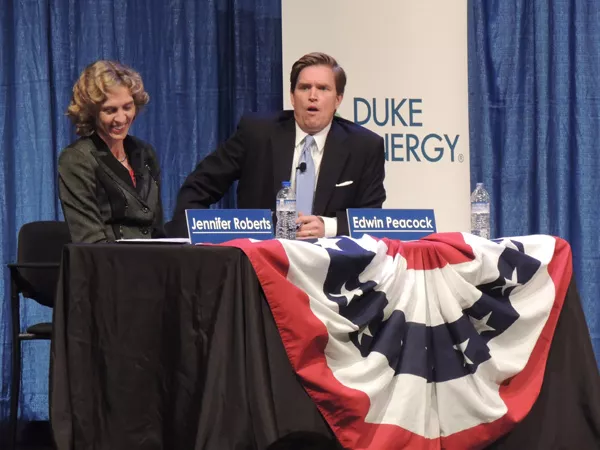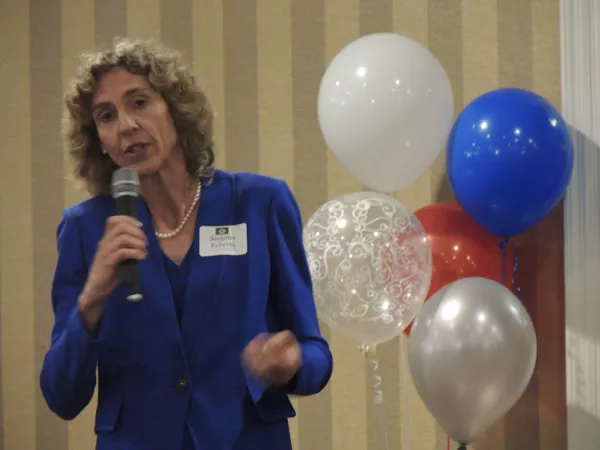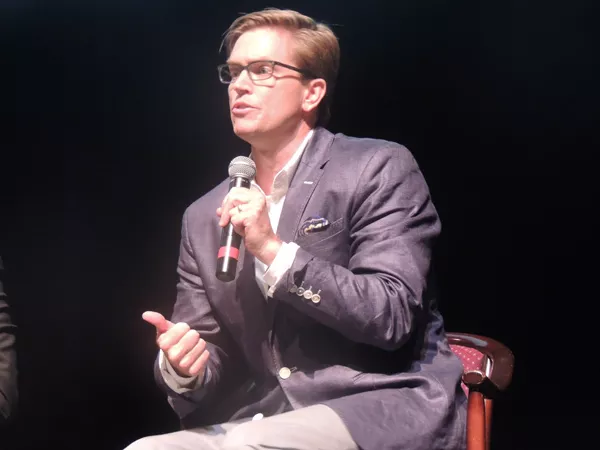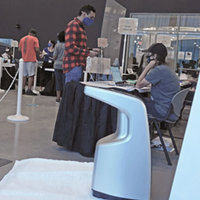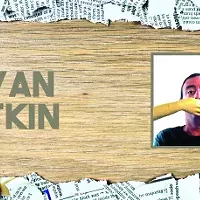Two mayoral candidates remain, but who will have the last laugh?
It's time for Charlotte to make a choice
By Ryan Pitkin, Joanne Spataro, Michael CooperWe've all heard the snarky comments. Now that current mayor Dan Clodfelter is out of the Charlotte mayoral race, come December, the city will have its fifth mayor in three years. It's been played up as a sign of instability, but hardly holds up as such.
While the arrest and guilty plea of Charlotte's last elected mayor, Patrick Cannon, is a seriously troubling stain on this city's history, the fact his predecessor Anthony Foxx left for a federal appointment in the Obama administration isn't anything to be ashamed of.
Foxx's interim replacement Patsy Kinsey didn't want the job to keep, and Cannon's replacement, Clodfelter, had also said as much before deciding he would make a go at a legitimate, elected tenure.
It's not a job I'd want, either. It's sort of like hosting the Oscars or umpiring the World Series. Sure, it looks good on your resume, but you're just putting yourself out there as the scapegoat for anything that goes wrong. The rewards never equal up to that sort of pressure.
In the end, Charlotte's mayor has just as much (and arguably less) power than any given member of city council. It is, however, an important position to play representative for a city that begs to be recognized on the international stage, and that can't be played down.
Endorsing one of the remaining two candidates is not a job I want either. I've met former county commissioner Jennifer Roberts and former city council member Edwin Peacock on multiple occasions and am familiar with their platforms. I honestly believe both would make for great leaders as Charlotte continues to be one of America's fastest growing cities.
That being said, I'll be passing the tough work on to two long-time Creative Loafing contributors, Michael Cooper and Joanne Spataro, and letting them plead the case for their respective candidates.
Whichever way you're leaning, be sure to get out there on Nov. 3 and vote. I'd say whomever you vote for, it's a safe bet they'll stay out of prison, so we're already on the way to a better choice than we made last time, folks. — Ryan Pitkin
Jenn Roberts is Keeping It Classy
She's one of us; that's all she's ever been
If you have nothing nice to say, stay on message; that's what Jennifer Roberts is doing in her bid to become the next mayor of Charlotte. She's sprinting to the finish line in a race to be the city's fifth mayor in three years, dodging the booby traps in her path that opponents have thrown to try to beat her in the polls.
Current mayor Dan Clodfelter — AKA "The 'Stache" — lobbed the first grenade in late September before the mayoral run-off with Roberts. His campaign team knew they were behind, so like Wile E. Coyote trying to outstrip the Road Runner, he painted a fake bullseye on an incoming wall, sending out two mailers bashing Roberts for cutting county education while she was chair of the Mecklenburg County Commission. Roberts' camp fired back that Clodfelter had lied, and his camp said no, she's still lying, the equivalent of them making a sour raspberry sound. Roberts won by 2,000 votes. After that somewhat contentious blip, she's kept a clean campaign.
Republican candidate Edwin Peacock III tossed the latest barb during the Charlotte Observer/WBTV debate at Spirit Square on Oct. 21. He drug her into the mud in the nicest way possible about her record on education, crime and the botched real estate reappraisal while she led the Commission. His golden quiff bobbed as he said the two were different, seeming to be conciliatory and putting down his handful of mud. But it was merely a prologue to smooshing it into her hair. Roberts kept her hands poised on the desk. She wasn't going to let him dirty her sensible gray suit jack today. Nor ever.
When asked to respond, Roberts' stoic expression was that of someone watching a toddler pitch their second fit of the morning. That's when she had a truly mayoral moment, reminiscent of presidential hopeful Hillary Clinton at the first Democratic Presidential debate. When asked if Clinton wanted to respond to a garbled jab by former glassy-eyed contender Lincoln Chafee, she clucked and said no, she wouldn't answer. In a similar response to Peacock at the Observer debate, Roberts said, "He's showing that he's desperate."
The Doris Day of the Charlotte mayoral race handily beats Peacock on local crime. Peacock wants to start a Crime Reduction Commission and have city council members do ride-alongs with officers to see what's going on in area neighborhoods. Roberts, though, already knows what's going on in these neighborhoods, the ones she won in the mayoral run-off with Clodfelter: north, east and west Charlotte. She is a proponent of building up local businesses and starting after-school programs to steer young people in a positive direction. Plus, she's been doing police ride-alongs for years.
She also gets specific about crime in a way Peacock does not: she has raised private money for a domestic violence shelter for women in west Charlotte. "My opponents have been saying I don't have a crime plan," she says. "[Peacock] hasn't been listening, or he doesn't think domestic violence is an issue."
Exclusion zones have become the next big issue in Charlotte. If implemented, this law would allow Charlotte-Mecklenburg police officers to cut off areas to people who have been arrested. Peacock said he's a proponent of instating anything CMPD needs to do their job, a cringe-worthy message in the wake of the killing of Jonathan Ferrell and unfortunate mistrial of the man who pulled the trigger. Roberts raised her "serious concerns" over instituting exclusion zones. Instead, she supports the recent implementation of dash and body cameras to maintain public safety.
Roberts' campaign of good vibes seems to be working: an Observer poll on Oct. 18 says she's at 54 percent to Peacock's 39 percent. She's polling high with women and African-Americans, two demographics Peacock can only dream about relating to. Both candidates have been lauded for their progressive views on the LGBT community, although Peacock said he would have vetoed the controversial public accommodations ordinance that aimed to end discrimination against LGBT residents and employees in Charlotte but was voted down by city council last March. He made this conclusion because he heard many of the almost 120 speakers felt this was a controversial issue and his gay and lesbian friends were "confused" by its ramifications.
Peacock wasn't at the meeting and couldn't see in real-time how many of these knuckle-dragging speakers were turning the ordinance into a disgusting diatribe against part of the ordinance: to allow transgender people to safely use the public restroom matching their identity. Roberts knows exactly what happened, because she was there during the nearly four-hour council meeting. She was one of the speakers supporting the ordinance.
That's the biggest difference Peacock isn't going to say about Roberts and himself: She's there when it counts. She doesn't need to say she did this or that or defend it. Because the proof is in the social media selfies and real-time hugs. Roberts is there alongside citizens while waiting for her Dairy Queen in Plaza-Midwood, wearing a loose shirt, khaki shorts and Birkenstocks. She doesn't need to prove she's one of us. She already is. You stay classy, Jennifer. — Joanne Spataro
The case for Edwin Peacock
He's the leader our city has been looking for all along
Not long after the 2013 election I sat down with Edwin Peacock at The Diamond Restaurant to reflect on things. I'd covered the race for Creative Loafing and Charlotte Magazine and I knew Charlotte could do better than Patrick Cannon. So, over lunch, we scribbled ideas on the back of a napkin as I tried to talk Ed into running again.
Edwin Peacock was one of the most impressive candidates I met covering politics for Loafing between 2011 and 2014, and the difference between his opponent during the last election was striking. When I interviewed Cannon he recited talking points from a script, while Peacock launched into a discussion of "The Metropolitan Revolution" (how cities are fixing America's broken politics and fragile economy) and "The Seamless City" (about a mayor who revitalized distressed parts of St. Petersburg).
I realized then that Ed was a man of ideas with a sincere interest in the complex issues facing the City of Charlotte. Now, 15 years into the 21st century, and days away from another election, Edwin Peacock understands that it's a critical moment for Charlotte and we're at a crossroads.
As the city grows, it grows unequal, and how Charlotte responds to its lack of economic mobility will define the city for decades. And that makes the role of mayor vitally important in a city without the ability to raise the minimum wage.
One of Charlotte's greatest mayors was a man named Herbert Baxter, who fought for Ovens Auditorium, Freedom Park and the investment of $12 million into a Program for Progress. He had so many ideas that when he reached into his coat pocket and pulled out a sheet of paper his audience flinched.
Edwin Peacock is that sort of leader. Youthful, energetic, optimistic and ready for reform, Ed embodies the spirt of John Kennedy's New Frontier, understanding that leadership is "not a set of promises" but a "set of challenges" summing up what you intend to ask of people.
He knows we're not going to solve inequality through government policy alone; it's going to take a united effort, from businesses, non-profits, student volunteers and the faith community because as Ronald Reagan once said, "we can't help everyone, but everyone can help someone."
Raised in the Lansdowne and Foxcroft communities, Peacock grew up in '70s Charlotte witnessing first-hand how Charlotte confronted issues of busing and integration to become a beacon of the New South.
Peacock's father was a business and community leader who advanced the discussion on city and county cooperation. Edwin took from his father's public service the lesson that, more than your votes, people will remember how you made them feel. To this day he remembers his father's concession handshake with Harvey Gantt in 1983 after Charlotte had elected its first African-American mayor and it was a Peacock who rose to the moment with dignity and class.
With his father's example fresh in his memory, Ed has called on Charlotteans to unite into his idea of a "seamless city" where no neighborhood goes forgotten and no child gets ignored, fully understanding Dr. King's statement that, "Men hate each other because they fear each other; they fear each other because they don't know each other; they don't know each other because they cannot communicate; and they cannot communicate because they are separated."
The candidate I've gotten to know on a personal level is ready to lead one of America's fastest growing cities. Ready to use the bully pulpit to fight for a 21st century infrastructure (instead of a 20th century streetcar), educational choices for families, increased mentorship for at-risk youth and more opportunities to bring people into the middle class like the apprenticeship program at Central Piedmont Community College. He'll also challenge citizens to do their part to carry out the coming recommendations of the Charlotte-Mecklenburg Opportunity Task Force.
The elephant in the room, of course, is that Edwin Peacock is a Republican. It's been said that a Republican can't win a mayoral election in today's Charlotte. But Peacock is a Republican who chaired the Environmental Committee on city council and called on Charlotte to be a national leader in preserving resources and balancing growth; a Republican with a better record on LGBT equality than most of Charlotte's elected Democrats.
Blind party loyalty elected Patrick Cannon, who will still be sitting in prison as Charlotteans hit the polls again, and that sort of unfounded straight-ticket voting is destroying American politics. So if you're tired of Republicans moving to the right in North Carolina and if you agree with Edwin Peacock on social issues, the environment and the need to transform Charlotte into a hub of commerce and trade, then vote for him.
The Charlotte city council is divided into factions and the city needs an outsider who will encourage Republicans and the business community to join the effort to solve the lack of economic mobility. It needs Edwin Peacock.
In the Cannon aftermath, the next mayor must also continue the effort to restore trust in government and faith in public service. So, on Nov. 3, voters will get a second chance to vote for Edwin Peacock and, this time, it's a vote for redemption. — Michael Cooper
Speaking of...
Latest in Cover
Calendar
-

Queen City R&B Festival & Day Party @ Blush CLT
-

Half & Half! @ CATCh
-
 Cirque du Soleil: OVO @ Bojangles' Coliseum
Cirque du Soleil: OVO @ Bojangles' Coliseum -

200 Hour Yoga Teacher Training in Rishikesh India @ Arogya Yoga School
-

Sound Healing Course in Rishikesh

